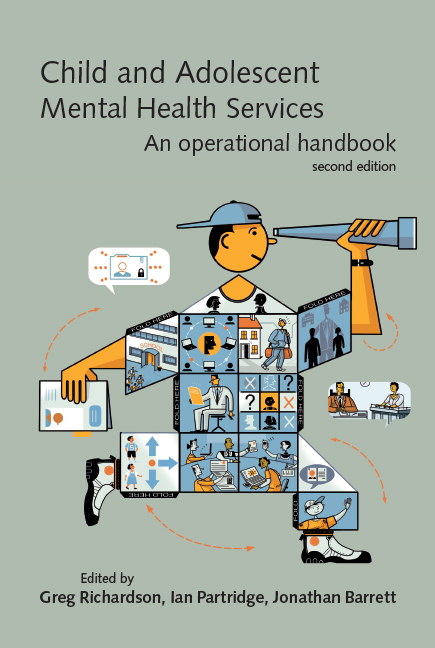Book contents
- Frontmatter
- Contents
- Tables, boxes and figures
- Contributors
- Abbreviations
- Preface
- 1 Introduction
- 2 CAMHS in context
- 3 CAMHS and the law
- 4 Structure, organisation and management of CAMHS
- 5 Evidence-based practice
- 6 Clinical governance
- 7 Education, supervision and workforce development
- 8 Multidisciplinary working
- 9 User and carer participation and advocacy
- 10 A comprehensive CAMHS
- 11 Referral management
- 12 Demand and capacity management
- 13 Strategies for working with Tier 1
- 14 Structuring and managing treatment options
- 15 CAMHS in the emergency department
- 16 Paediatric liaison
- 17 Self-harm
- 18 Learning disability services
- 19 Services for autism-spectrum disorders
- 20 Attentional problems services
- 21 Eating disorder teams
- 22 Bereavement services
- 23 CAMHS for refugees and recent immigrants
- 24 CAMHS and looked-after children
- 25 Drug and alcohol teams
- 26 Parenting risk assessment service
- 27 Court work
- 28 Tier 4 options
- 29 In-patient psychiatric care
- 30 Forensic services
- 31 Neuropsychiatry and neuropsychology services
- 32 Mental health provision for deaf children: study of a low-incidence service provision
- 33 Chief Executives – what do they want and how do they get it?
- Index
27 - Court work
- Frontmatter
- Contents
- Tables, boxes and figures
- Contributors
- Abbreviations
- Preface
- 1 Introduction
- 2 CAMHS in context
- 3 CAMHS and the law
- 4 Structure, organisation and management of CAMHS
- 5 Evidence-based practice
- 6 Clinical governance
- 7 Education, supervision and workforce development
- 8 Multidisciplinary working
- 9 User and carer participation and advocacy
- 10 A comprehensive CAMHS
- 11 Referral management
- 12 Demand and capacity management
- 13 Strategies for working with Tier 1
- 14 Structuring and managing treatment options
- 15 CAMHS in the emergency department
- 16 Paediatric liaison
- 17 Self-harm
- 18 Learning disability services
- 19 Services for autism-spectrum disorders
- 20 Attentional problems services
- 21 Eating disorder teams
- 22 Bereavement services
- 23 CAMHS for refugees and recent immigrants
- 24 CAMHS and looked-after children
- 25 Drug and alcohol teams
- 26 Parenting risk assessment service
- 27 Court work
- 28 Tier 4 options
- 29 In-patient psychiatric care
- 30 Forensic services
- 31 Neuropsychiatry and neuropsychology services
- 32 Mental health provision for deaf children: study of a low-incidence service provision
- 33 Chief Executives – what do they want and how do they get it?
- Index
Summary
‘No man is exempt from saying silly things. The misfortune is to say them seriously.’
Michel Eyquem de Montaigne (1533–1592)Introduction
Reports from mental health professionals may be requested in both civil and criminal proceedings. The mental health professional may be asked to prepare a report for the court as a professional witness when the report is on a current or recent patient, or as an expert witness when they are considered to have particular expertise in the field on which the court has to make a decision. As a general rule, therefore, expert work in the criminal courts is best left for those working in the forensic field. The primary responsibility when preparing a report is to the court and it is important that the patient and their family are made aware of that. The primary consideration when preparing a court report is the child's welfare, no matter who has commissioned it or who will pay for it (Department of Health, 1991). This principle must be clear throughout any work for the courts, and the report must not be altered because of pressure from those who have commissioned it. A structure for addressing court work has been described for clinical psychologists (British Psychological Society, 2000), psychiatrists (Tuffnell et al, 1996; Black et al, 1998) and for all those involved in Children Act cases (Wall, 2007). The problem of quality and supply of expert witnesses in family law cases has been addressed by the chief medical officer, in proposing local teams of experts from different disciplines and specialisms under the aegis of the NHS (Donaldson, 2006). Those who work at the interface between CAMHS and the law have an obligation to provide their patients and legal bodies with clear, focused reports prepared to the highest standards, and give oral testimony with a dignified and confident professional demeanour.
Questions to consider
Does the request come from a solicitor?
Requests for court reports must always come from a solicitor. Requests by parents, carers or social workers should be refused, and the person making the request referred back to their legal representative. There has been a move over recent years for joint instructions to be issued for expert opinion, in an attempt to lessen the adversarial nature of children's proceedings.
- Type
- Chapter
- Information
- Child and Adolescent Mental Health ServicesAn Operational Handbook, pp. 248 - 258Publisher: Royal College of PsychiatristsFirst published in: 2017



